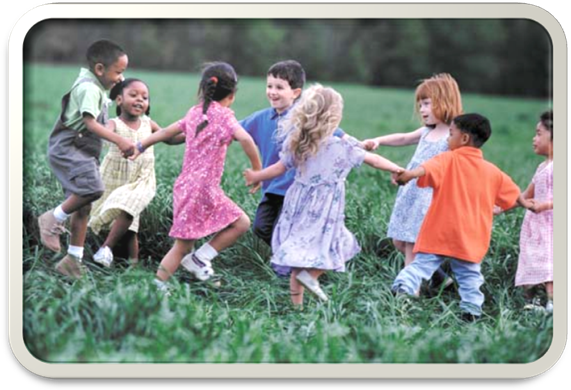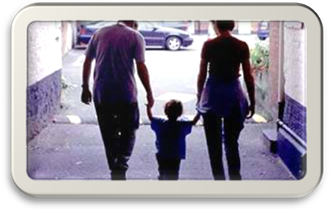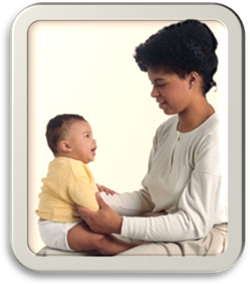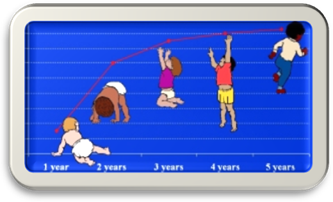Course Overview
Thinking about your career or careers brings thoughts of the schooling and training that will be involved in preparing you for that vocation. It may take years to get you equipped. What about your future as a parent? How much time will you spend studying and in training for that responsibility?
Parenting involves many years of a person’s life, but often people are not prepared for the challenge. This course will encourage you to think about skills involved in parenting, explore if or when you would like to become a parent, and the development and changes which occur during a pregnancy. Child Development, in addition, will explore the growth a child experiences through physical, emotional, moral, social, and intellectual development.
Many careers available today touch on some facet of child development. This course will briefly touch on some of these professions, looking at what is involved and the training necessary.

LEARNING ABOUT
CHILDREN--AN OVERVIEW
Unit
Overview
Parenting is a job many people work at during their lifetime. Very few people have training to be a parent and therefore it may be stressful. Having knowledge of the skills involved in parenting, knowing how children have changed over the years, and family dynamics are valuable to people who may have children.

Parenting
When you hear the word parenting what comes to mind? Do you imagine a couple holding their newborn for the first time? Do you see the toddler being permitted to run through the mud puddle to experience the splashing? Do you see a teen arguing with parents over homework, the cell phone, or the amount of time they spend playing video games. A better explanation of parenting is to provide care, support, and guidance to a child so the child may grow and develop into a healthy, mature, well-adjusted citizen.
What skills do parents need? Parents need to be mature so they can put the needs of the child before their own needs.
 Communication
skills are important to parents. Parents
need to be able to communicate verbally, which is using words. They also need to communicate through
nonverbal means, such as giving the child encouragement with a smile or a
warning with a stern look. Parents also
need to be able to decode the messages being sent by their child. When a baby first arrives, his only method of
communication is crying. The crying baby
may need a diaper change, may need to be burped, may be hungry, or may be
saying “I need you to pick me up and hold me.”
As new parents become more experienced they are able to decode the
crying more quickly to get the right message.
Communication
skills are important to parents. Parents
need to be able to communicate verbally, which is using words. They also need to communicate through
nonverbal means, such as giving the child encouragement with a smile or a
warning with a stern look. Parents also
need to be able to decode the messages being sent by their child. When a baby first arrives, his only method of
communication is crying. The crying baby
may need a diaper change, may need to be burped, may be hungry, or may be
saying “I need you to pick me up and hold me.”
As new parents become more experienced they are able to decode the
crying more quickly to get the right message.
Parents need to love their child unconditionally and be able to communicate that love to the child. The child needs to recognize that they are loved even if their parents are not happy with an action they have taken.
Management is a skill that is important for parents. They learn to be able to get their work done as well as make sure items are ready for the children, for example, preparing formula and having diapers on hand for their child. Many parents are employed outside the home which makes organization even more important. When a parent leaves for work they need to make sure everything is ready for their child’s day. Whether the child’s day is at home, at a babysitter’s home, or a day care center, everything needs to be ready.
Parents need to be able to love their child and be willing to do what they can to help the child grow into a responsible adult. Being mature helps parents put the needs of the child before their own personal needs. Parents also need to be able to express their love to their child.
Parents teach their children what is right and what is wrong; the morals appropriate in the society where they live. The parents also pass down traditions or customs that are part of their heritage. Traditions are activities families repeat, such as always having cake and ice cream to celebrate birthdays.
Parents are working toward having their child become independent and able to take care of their own needs. This requires patience. For instance, a parent can dress a child in a fraction of the time it takes the child to dress themselves. Being patient with the child allows them to practice this skill without less frustration.
Parents need to develop decision-making skills. They are continually called on to make decisions, such as which diapers to purchase, what caregiver they should choose, or whether or not to allow their teenager to go the concert on Friday night.
Parents need to be able to settle conflicts when they arise. These disagreements may be between the couple, between a parent and child, or between two children. The conflict should be worked through by listening to all views and staying calm. Losing your self-control will not help the situation. Focusing on the current problem will also aid parents in reaching an acceptable conclusion.
People other than the parents who take care of children are
called caregivers. Caregivers provide
care and guidance for children when their parents are not available. These caregivers may be a variety of people. Caregivers may be, but are not limited to, a
day care worker, a grandparent, an older sibling, or a friend of the family. It is helpful if they have at least some of
the skills mentioned for parents in that they are completing many of the same
tasks but for a shorter period of time.
Reasons
for Studying Child Development and Parenting
By studying child development and parenting information a person becomes more informed about what the total picture of being a parent involves. Studying parenting could also be considered training for a future job. We would never consider asking someone to be an airplane pilot if they had not learned some basic information about the science of flying an airplane. A person should not become a parent without some basic knowledge of what is involved with the job.
The information may lead a person to decide parenting is not for them. They may decide that their career requires too much travel and it would be hard to take care of a child at the same time. Cost may be a factor that causes potential parents to postpone becoming a parent or deciding against parenting completely.
![j0178833[1]](FCSCDLearning_Overview_image009.png) By studying child
development you learn about the different types of development involved in the
growth of the total child. Physical
development includes the development of the large and small muscles. Large muscles are those muscles involved with
running and jumping. Small muscles are
the muscles used to color a picture or to pick up small puzzle pieces. Intellectual development is the brain and
thinking skills.
By studying child
development you learn about the different types of development involved in the
growth of the total child. Physical
development includes the development of the large and small muscles. Large muscles are those muscles involved with
running and jumping. Small muscles are
the muscles used to color a picture or to pick up small puzzle pieces. Intellectual development is the brain and
thinking skills.
Consider the fact that when a baby arrives in the world they
do not know the meaning of a single word. A child learning to communicate with others is
a part of their social development. Learning
to control emotions and not crying every time you do not get your way is part
of the emotional development. Moral
development is learning what is considered right and wrong in the society where
the child lives.

Learning about the growth of a child also provides insight into the timing of their development. In order to determine that a child’s development is where it should be, parents need to be aware of the different milestones in a child’s life. Should they be able to roll over by the time they are a 6 days old, 6 weeks old, or is it 6 months old? Each child will reach these milestones at their own pace, although they all follow the same sequence.
![j0422108[1]](FCSCDLearning_Overview_image013.png) Knowing about the medical needs of a child
is also imperative. Children need to
have regular medical checkups so the doctor can monitor the child’s growth. This assures the parent that the child is progressing
as they should. The doctor also provides
immunization shots to protect the child from a variety of diseases, such as
polio and rubella.
Knowing about the medical needs of a child
is also imperative. Children need to
have regular medical checkups so the doctor can monitor the child’s growth. This assures the parent that the child is progressing
as they should. The doctor also provides
immunization shots to protect the child from a variety of diseases, such as
polio and rubella.
By continuing to read and learn about child development parents keep informed about the current practices and medications available. The Internet facilitates learning information about the current practices that are considered the best.
Children
in the Past
Years ago having a large family was necessary to have someone to help with the farm work. Children were an asset for taking care of the animals and helping to raise food, both for human consumption and to feed the animals.
The description of children in families has changed through the years. At one time large families were important and necessary as their help was needed in caring for animals and completing chores on the farm. As our society has moved from being a rural and agriculture based society the needs for the large families has decreased. Family size has decreased and parents have waited until they are older to have children.
Many parents are employed outside of the home, which makes it necessary for daycare when the child is out of school at the end of the day. Kidnappings and abductions have made it so that children have less freedom than in years past.
Prior to 1900, many infants died before their first birthday. This was often due to infections, which are treated today with antibiotics.
Technology is more a part of society than it was fifty years ago. For instance, doctors have more equipment available for testing and tracking children’s illnesses, as well as monitoring pregnancy. The use of educational technology is now known to have a major, positive impact on the social, emotional, language, and cognitive development of children.
Media, or mass communication, has greatly expanded over the last few years. Information about events happening around the world is available to us within minutes of when it occurs. Mass communication methods include: the Internet, television, radio, newspaper and magazines.
Click on the button below to read an article from Encyclopedia Britannica. You will be using this information to answer question #24 in the question and answer section of this unit.
Functions
of the Family
One of the functions of a family is to provide the necessary money needed by a child. This includes the funds for buying the food and clothing necessary as the child grows and develops. At times, the monetary needs are too much for a family. There are community resources available, such as a loan for college. At times, when medical expenses exceed the cash available, community members, such as the fire department or mothers’ club, may hold a fund raiser to assist the family.
Another function is to provide a place to live. This may be an apartment, a mobile home, or a single family home, just to name a few of the housing choices available today. The home should provide protection from weather extremes, as well as be safe. This safety can be from intruders or from dangers, which may be in the home. For example, parents should make sure that the paint used in the home is lead free and the electrical outlets are covered.
Families provide care when someone is sick and offer support for each other, when family members become involved in school, sports, and community activities. Families supply emotional support for each other, as well as love.
Click on the button below to read an article from Encyclopedia Britannica. You will be using this information to answer question #26 in the question and answer section of this unit.
Unit
Conclusion
In conclusion, there are many aspects to the complex facets of families and the role of parents in today’s society.
 Now answer questions 1 through 25.
Now answer questions 1 through 25.
 |
| Unit 1 Learning About Children (Fill in the Blank) Worksheet |
| Unit 1 Learning Aboug Children (Word Scrambler) Worksheet |
